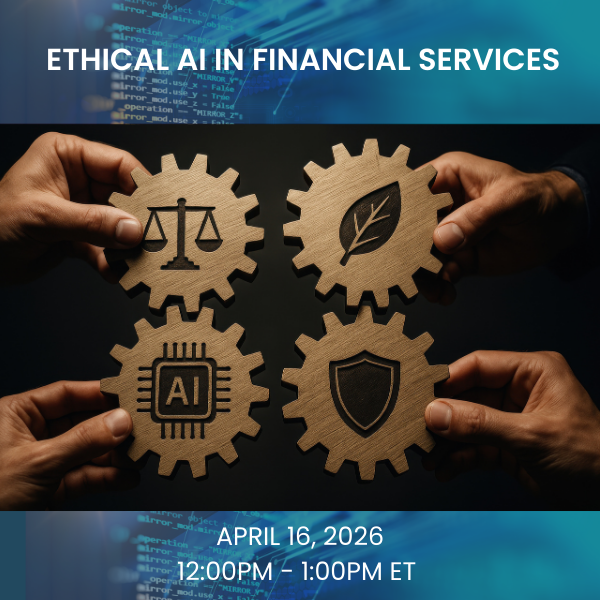 Image 1 of 1
Image 1 of 1


Ethical AI in Financial Services: Balancing Innovation with Regulation
📅Date: 4/16/2026 ⏱️Duration: 60 minutes
📊Expertise Level: Intermediate
Description
Artificial intelligence is transforming how financial institutions detect fraud, assess risk, and serve customers — but with this innovation comes new regulatory and ethical challenges. This course explores how banks, fintechs, MSBs, and crypto providers can adopt AI responsibly while meeting compliance expectations. Participants will learn how regulators are approaching AI oversight, what ethical principles apply to financial decision-making, and how to build internal governance frameworks that ensure fairness, transparency, and accountability. Whether your organization is exploring chatbots, credit scoring models, or transaction monitoring tools, this session offers practical guidance for aligning AI adoption with ethical and regulatory standards.
Who This Is Designed For: Compliance professionals, risk officers, data analysts, fintech and bank relationship managers, and audit teams seeking to understand the ethical and regulatory implications of AI use in financial services.
Agenda:
AI in Financial Services Today – Understanding how institutions are applying AI across compliance, risk, and customer operations.
Regulatory Landscape – Overview of current and emerging guidance from agencies such as the CFPB, OCC, FTC, and EU regulators on AI use.
Ethical Considerations – Addressing bias, transparency, explainability, and accountability in AI-driven systems.
Governance and Oversight – Building internal policies for responsible AI adoption, documentation, and model validation.
Practical Applications and Case Studies – Examples of ethical and unethical AI use in areas such as credit underwriting and fraud detection.
Preparing for the Future – How compliance and risk teams can collaborate with data and technology leaders to manage AI safely and effectively.
By the End of This Webinar, You Will Be Able To:
Describe how AI is used within financial institutions and fintech programs.
Identify key ethical risks such as bias, privacy concerns, and lack of transparency.
Recognize regulatory expectations around the use of AI in compliance and customer interactions.
Develop strategies for building an internal governance framework for responsible AI.
Communicate effectively with stakeholders about the ethical and operational impacts of AI.
🎓Learning Path:
AI in Compliance & Risk
🏅Accred:
ACFCS
👥Who should take it:
Risk, compliance, tech, data science leaders
📘Syllabus Preview:
Ethical AI principles, regulatory risk, data bias, use-case risk management.
Note: This program meets the eligibility criteria for continuing education under ACFCS and is eligible for 1 credit.
📅Date: 4/16/2026 ⏱️Duration: 60 minutes
📊Expertise Level: Intermediate
Description
Artificial intelligence is transforming how financial institutions detect fraud, assess risk, and serve customers — but with this innovation comes new regulatory and ethical challenges. This course explores how banks, fintechs, MSBs, and crypto providers can adopt AI responsibly while meeting compliance expectations. Participants will learn how regulators are approaching AI oversight, what ethical principles apply to financial decision-making, and how to build internal governance frameworks that ensure fairness, transparency, and accountability. Whether your organization is exploring chatbots, credit scoring models, or transaction monitoring tools, this session offers practical guidance for aligning AI adoption with ethical and regulatory standards.
Who This Is Designed For: Compliance professionals, risk officers, data analysts, fintech and bank relationship managers, and audit teams seeking to understand the ethical and regulatory implications of AI use in financial services.
Agenda:
AI in Financial Services Today – Understanding how institutions are applying AI across compliance, risk, and customer operations.
Regulatory Landscape – Overview of current and emerging guidance from agencies such as the CFPB, OCC, FTC, and EU regulators on AI use.
Ethical Considerations – Addressing bias, transparency, explainability, and accountability in AI-driven systems.
Governance and Oversight – Building internal policies for responsible AI adoption, documentation, and model validation.
Practical Applications and Case Studies – Examples of ethical and unethical AI use in areas such as credit underwriting and fraud detection.
Preparing for the Future – How compliance and risk teams can collaborate with data and technology leaders to manage AI safely and effectively.
By the End of This Webinar, You Will Be Able To:
Describe how AI is used within financial institutions and fintech programs.
Identify key ethical risks such as bias, privacy concerns, and lack of transparency.
Recognize regulatory expectations around the use of AI in compliance and customer interactions.
Develop strategies for building an internal governance framework for responsible AI.
Communicate effectively with stakeholders about the ethical and operational impacts of AI.
🎓Learning Path:
AI in Compliance & Risk
🏅Accred:
ACFCS
👥Who should take it:
Risk, compliance, tech, data science leaders
📘Syllabus Preview:
Ethical AI principles, regulatory risk, data bias, use-case risk management.
Note: This program meets the eligibility criteria for continuing education under ACFCS and is eligible for 1 credit.

